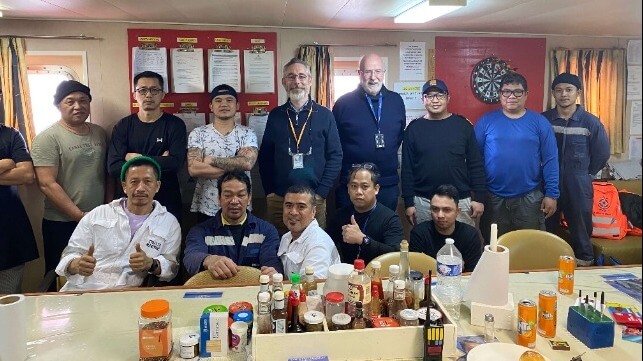Shipping Trade Groups Call on UN to Protect Seafarers

Sixteen commercial maritime industry associations joined together in a letter to the Secretary-General of the United Nations Antonio Guterres calling for action while saying the current situation where merchant ships and their crews are being targeted is “intolerable” and “unacceptable.”
The groups thanked the Secretary-General and IMO Secretary-General Arsenio Dominguez for their efforts and hard work on behalf of seafarers and for raising the profile of the commercial shipping industry. They recognized the efforts that have highlighted the critical nature of free movement while saying seafarers and the maritime sectors are neutral and must not be politicized.
“We have seen a worrying increase in the attacks on shipping,” the letter states. They cite that Iran is now holding four commercial vessels (the tankers Advantage Sweet, Niovi, and St Nikolas and now the MSC Aries). The Houthis in addition are holding a fifth vessel, the car carrier Galaxy Leader, and its crew.
“The world would be outraged if four airliners were seized and held hostage with innocent souls onboard. Regrettably, there does not seem to be the same response or concern for the four commercial vessels and their crews being held hostage,” the letter states. It is signed by the major shipping organizations (ASA, BIMCO, CLIA, ECSA, INTERCARGO, INTERMANAGER, INTERTANKO, IAPH, ICS, IFSMA, IMCA, IMEC, IPTA, ITF, FONASBA and WSC).
They highlight that in addition to the crewmembers who are being held in Iran and Yemen, seafarers were killed during a Houthi attack earlier this year. “This would be unacceptable on land, and it is unacceptable at sea,” the groups write.
They are asking the UN to assist with “every effort possible,” to aid in the release and protection of seafarers. They call for all member states to be reminded of their responsibilities under international law to seafarers and due to the evolving and severe threat profile in the Middle East call on the UN for enhanced coordinated military presence to protect seafarers.
The letter comes as all the nations with crewmembers aboard the MSC Aries have been pressuring Iran to release the crew. Indian officials confirmed that a female cadet aboard the containership has returned to India, and they said Iran asserts that the crew is not being detained and can leave the country.
Previously, the Philippines worked with Iran to exchange the crew aboard the tanker St Nikolas and was able to bring home the crewmembers who had been trapped on the ship for months. Iran however required a replacement skeleton crew to maintain the ship.
Stella Maris Warns of High Levels of Depression Among Ukrainian Seafarers

[By: Stella Maris]
Seafarer charity Stella Maris is warning that Ukrainian seafarers are experiencing increased levels of loneliness and depression amid fears of conscription if they return home as the war enters its third year.
Stella Maris regional port chaplains for Southampton and Southern ports, Charles Stuart and Gregory Hogan, who make multiple daily ship visits report Ukrainian seafarers are under increasing strain.
“The initial stresses have been replaced by something else,” Hogan says. “At first there was the shock of the invasion for Ukrainians and real worry about whether family and friends could get out of dangerous areas. Now there is dealing with the compounded pressure of more than two years of war. It is a deeply depressing and worrying situation with no end in sight. In addition, there is the very real fear of being conscripted into the army if they return home.”
Mr. Hogan said that improved WiFi access can create more anxiety and feelings of helplessness when seafarers access media and war reports.
“I met a captain who came in and then started crying,” Hogan says, “His mother in law was in one of the areas being bombed and he hadn’t heard from her, yet he was also having to take charge of his ship. We see that many of the seafarers can be exhausted. They can access so much information online now, more than ever before, and have access to distressing often graphic news reports.
“But while they can access the latest news, they feel powerless to do anything about it. The ability to stay in touch can also lead to anxiety. We have seen seafarers deeply distressed because they haven’t heard from their wife or partner or parents in 24 hours. They might worry about this all night and then have to work the next morning in an exhausting role.”
Hogan further reports growing fears of conscription among the younger generation of seafarers.
“We speak to many who feel they have no option but to keep working,” Hogan reveals. “They feel they cannot return to Ukraine for fear of being conscripted yet some still have relatives in Ukraine, who they dearly want to visit, but again there is that fear of conscription should they go back. They have no option but to work continually in a challenging, often lonely role.”
Mr. Stuart, meanwhile, said that the need to keep working and being confined to ship for lengthy periods is taking a huge toll.
“We regularly meet seafarers who may not be able to go ashore for many weeks or even months, which is harmful to their mental health and wellbeing, especially if they have signed a contract to work on board for nine months at a time,” he said. “We must all as an industry the seafarer charities, ship operators and captains try and tackle this pattern. We learned from covid spending long periods on ships is just not healthy. Shore leave is essential. And having someone independent from the ship to talk to in confidence, like Stella Maris, is equally vital.”
Mr. Hogan recounted the story of a crew member who he sat down with during lunch.
“I knew he could only have an hour at most,” he recalls. “I kept asking, should I go, I am imposing. And he said ‘no, I can eat this in 30 seconds. I am enjoying having someone different to talk to.”
The chaplains said many ships visiting UK ports are still operating both Russian and Ukrainian crew, with no option but to work as a team.
“A common response is ‘we are seafarers, we conduct ourselves properly. We don’t let world events impact our working relationships,” Stuart says. “Still it’s not ideal for the mental health of the crew when there is so much tension already about the conflict. And there are rules against talking about the war which can bottle feelings up.”
Hogan adds there are no winners as the conflict continues, with Russian crew members facing challenges too.
“The Russian crews can have concerns about the war and fear speaking out,” he says. “One captain took me aside and on his computer showed me how his pension had been destroyed, and he blamed Putin. He was incredibly angry that the savings on which his parents’ healthcare relied had been wiped out.”
The products and services herein described in this press release are not endorsed by The Maritime Executive.
No comments:
Post a Comment